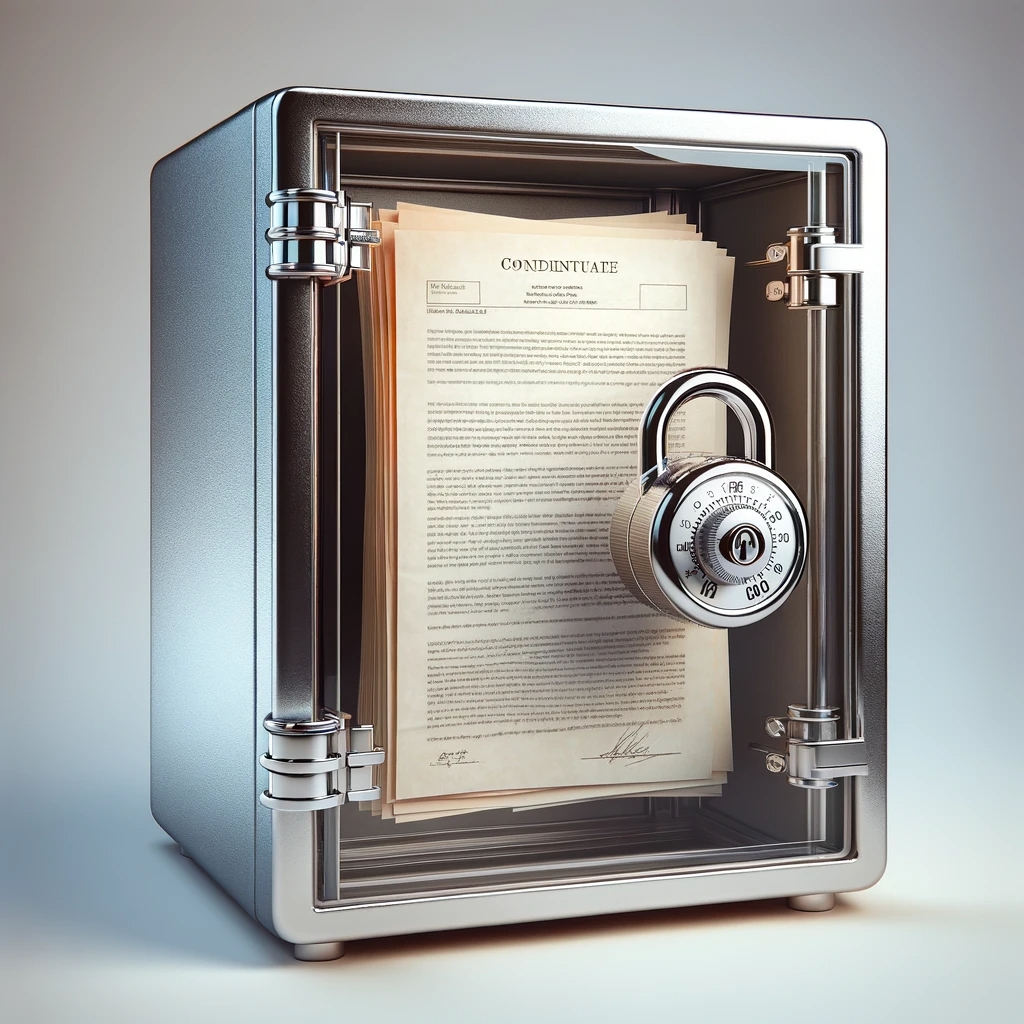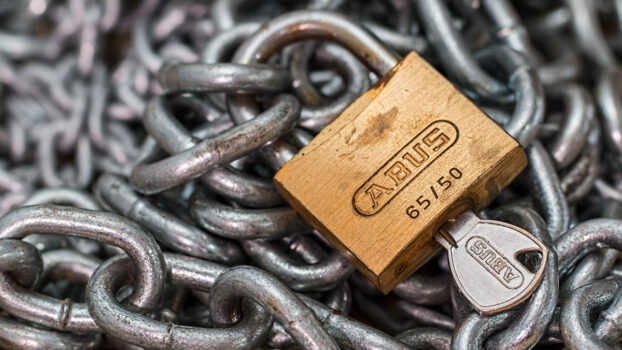Today, we’ll unlock the mysteries of a crucial component in Bitcoin: what is a private key? This piece is your golden ticket to understanding the secure underpinnings of cryptocurrencies. We’ll explore the role of these keys in the cryptography realm, the safety measures they provide, and their influence in your journey through the digital currency landscape. Ready to gain insights that could bolster your digital currency know-how? Let’s dive in!
What Is a Private Key?
At its core, a private key is a mix of numbers and letters that helps you prove your rights to your Bitcoins.
Imagine it as a secret digital signature, proving your ownership, much like a PIN secures your bank account. This unique alphanumeric code is what you use to access and manage your assets on the blockchain.
Let’s put it in perspective.
Suppose you own Bitcoin. Your coins aren’t physically stored somewhere. Instead, they’re on a decentralized public ledger known as blockchain. Think of the blockchain as a vast, public record of all transactions.
So, how do you prove you own this bitcoin? Enter: the private key. It essentially says, “Hey, I have the rights to these assets.”
Without your private key, you cannot prove ownership of your digital assets. If it’s lost or stolen, your digital assets are as good as gone.
This underscores the fact that knowledge about private keys is not only important, but practically indispensable for anyone delving into the realm of Bitcoin.
How Does a Private Key Work?
Picture a private key as a key to a safe box, where the box represents your Bitcoin wallet. Just like you’d need a key to open a physical safe, you need your private key to unlock your digital wallet and access your coins.
Now, when you use this private key, you create a unique signature for any operation, like sending your Bitcoin. This process is called signing. And it is crucial for maintaining the safety and security of your digital assets. In essence, it’s a way to say, “It’s genuinely me.”
But here’s the kicker – you don’t want everyone to have your private key, right?
This is where public keys come into play. A public key is like the visible lock on the outside of your safe. When you want to receive digital currency, you provide your public key to the sender.
Here’s how it works: when you sign a transaction, it’s like putting a document in your safe and locking it. Anyone can see that there’s a document inside, but only you can unlock the safe and alter the document.

This is essentially what happens when you make a transaction on the blockchain. Your signature verifies the transaction, while the public key lets others verify that the signature matches and the transaction is valid.
Linking Private Keys With Seed Phrases and Wallets
Where does the private key come from, and how is it related to seed phrases and crypto wallets? Let’s delve into that.
It is generated when you set up a wallet. A wallet is a digital tool where you store your coins, even though they remain on the blockchain. Your wallet uses your private key to create transactions and prove the ownership of the assets you’re transacting with.
Now, onto seed phrases. When you create a wallet, you receive a seed phrase, also known as a mnemonic, or recovery phrase. This is usually a list of 12 or 24 random words. It’s like a master key that can generate your private key. If you lose your private key, you can use this seed phrase to recover it.
So, how do these elements connect?
Your crypto wallet uses the private key to authorize transactions. The seed phrase is the backup to regenerate the private key if needed. Together, they work to ensure the safety of your digital assets.
Safeguarding And Managing Private Keys
As we’ve seen, private keys are integral to securing your digital assets. But what happens if you lose it, and how can you prevent such a scenario?
First off, losing it is like losing the combination to your safe – you can’t access what’s inside. In the case of Bitcoin, you won’t be able to access your coins.
Remember, the blockchain is decentralized, meaning there’s no central authority like a bank to help you recover your lost key. If you lose your private key, so too is access to your digital assets. They’ll remain dormant on the blockchain forever.
This is why securing it is absolutely critical.
The private key must remain secret at all times, because revealing it to third parties is equivalent to giving them control over the bitcoins secured by that key. The private key must also be backed up and protected from accidental loss, because if it’s lost it cannot be recovered and the funds secured by it are forever lost, too.
Andreas M. Antonopoulos, Mastering Bitcoin: Unlocking Digital Cryptocurrencies
So, how can you protect your private key and, by extension, your digital assets? Here are some best practices:
- Store it offline: Keeping your private key offline (in cold storage) helps protect it from hackers. This could be as simple as writing it down on paper and storing it safely, or using a hardware wallet.
- Keep backups: Make sure you have multiple secure backups of your private key and your seed phrase. This could mean writing them down and storing them in different safe locations.
- Never share it: Your private key should remain private. Never share it with anyone, and be wary of phishing attempts, where scammers may try to trick you into revealing it.
- Use strong wallets: Use reputable, well-reviewed cryptocurrency wallets. These often have enhanced security features to help protect your private key.
In the world of digital assets, your private key is the linchpin of your security. Guarding it carefully and responsibly will ensure your funds remains secure.
Frequently Asked Questions
A private key is a string of characters that can look like random gibberish at first glance. It’s typically a long sequence of numbers and letters, generated using specific cryptographic rules. For example, it might look something like this: “057fd68f73f1e1aa9f310fff1e9a2462c2da8891ed36b6372e3bdaff40e5d1e6”.
When you first set up your wallet, it usually creates and stores your private key. The wallet might keep it hidden for security reasons, so you may not directly see it. If you have a software wallet, there’s often a function to export or display your private key. For hardware wallets, it never leaves the device. If you forget your key, you’ll typically use your seed phrase to recover your wallet and associated private key.
A private key is generated using complex mathematical algorithms when you set up a wallet. The process is mostly automatic and random, creating a unique and secure string of characters. The specific algorithm used depends on the cryptographic system in place. For Bitcoin, for instance, the Elliptic Curve Digital Signature Algorithm (ECDSA) is used.
While it’s technically possible for a private key to be hacked, the chances are extremely low due to the complexity of the mathematical algorithms involved. However, hackers can steal private keys, if not stored securely. Cybercriminals often try to trick people into revealing their keys through phishing scams or malware.
A private key is extremely important in the world of cryptocurrencies and blockchain technology. It’s your unique digital signature that authorizes transactions and proves ownership of your digital assets. Without it, you can’t access or manage your assets.
Conclusion
To sum up, private keys are like the secret PIN to your digital assets on the blockchain. They are the heart of the cryptographic processes that secure your Bitcoins, and they work hand in hand with public keys to validate your transactions on the blockchain.
We also learned that these private keys come into play when you set up a digital wallet, which serves as the interface for your transactions. Seed phrases, on the other hand, act as a lifeline, helping you recover your private key in case it’s lost.
Safeguarding your private key, therefore, becomes absolutely essential. Storing it offline, keeping secure backups, never sharing it, and using reputable wallets are some of the best practices that can help you protect your digital assets.
Understanding what a private key is, its role, and its importance is fundamental to anyone venturing into the world of Bitcoin and blockchain technology. But remember, this is just the tip of the iceberg. The realm of blockchain and digital currencies is full of fascinating concepts and technologies that are redefining how we think about finance and transactions.
As you continue your journey, we encourage you to dive deeper into related topics, like crypto custody – a crucial part of managing and securing digital assets. With a good grasp of these principles, you’ll be well-equipped to navigate the exciting world of digital currencies confidently.
